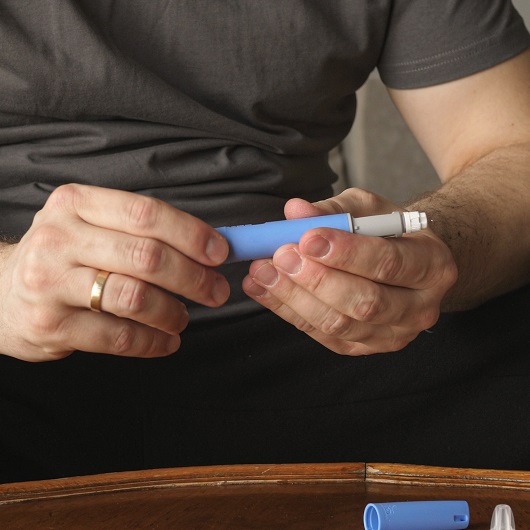Are Weight-Loss Injectables Safe?

December 24, 2024
Injectable drugs are a popular new way to help people lose weight, and many people have seen terrific results. But are they right for everyone? And how can you safely get a weight-loss drug such as Ozempic?
Our expert, Sebastian R. Eid, M.D., FACS, assistant program director of the Minimally Invasive/Bariatric Surgery Fellowship at Hackensack University Medical Center and assistant professor of surgery at Hackensack Meridian School of Medicine, explains what you need to know.
FDA-Approved vs. Unapproved Injectables
The popularity of weight-loss drugs has skyrocketed recently. As a result, weight-loss drugs approved by the Food and Drug Administration (FDA), like Ozempic, are in short supply.
Online companies have advertised low-cost weight-loss injectables. These ads may make it seem like these drugs are available over the counter (OTC). However, these online stores still require a prescription. The FDA has not approved any OTC injectables.
While these options are significantly cheaper and may be easier to obtain than injectables such as Ozempic, “You’re not exactly sure what you are getting,” Dr. Eid warns.
Safety Concerns
Ozempic and other prescription weight-loss injectables have been reviewed and proven safe and effective. Other non-FDA-approved versions have not. While these versions could be safe, “They are not backed by the FDA,” says Dr. Eid, and there is no data to prove they are effective.
The FDA has issued statements about unapproved weight-loss injectables, noting many people have reported negative effects from these products due to dosing errors. These adverse effects could include:
- Nausea and vomiting
- Fainting
- Severe headache
- Acute pancreatitis
- Gallstones
Some of these events have led to hospitalization.
What is the Best Way to Get Weight-Loss Injectables?
Due to the unknowns of online weight-loss injectables, Dr. Eid says, “The best way to get a weight-loss injectable is to see your doctor.” Most primary care physicians can offer medication options, but multidisciplinary weight management programs can also help with education on nutrition and exercise.
Many insurance companies will not continue to pay for Ozempic after you achieve your goal weight, so a multidisciplinary approach can help you modify your lifestyle habits and maintain your goal weight.
Weight-Loss Injectables Aren’t for Everyone
The FDA has approved injectables for those with a body mass index (BMI) of 27 or greater who have at least one comorbidity, such as diabetes or high blood pressure, or for people with a BMI of 30 or greater.
Don't take weight-loss injectables if:
- You have kidney or pancreatic issues.
- You are pregnant or breastfeeding.
- You have a history of endocrine or thyroid problems.
- You have a family history of endocrine or thyroid cancer.
While injectables may seem like magic, review all your options, and talk to your doctor to see if weight-loss injectables are right for you.
While online stores offer tempting prices and easy access, they are also risky. For the safest approach, Dr. Eid concludes, “You’re better off dealing with a doctor.”
Next Steps & Resources
- Meet our source: Sebastian R. Eid, M.D., FACS
- Make an appointment with a weight management expert near you or call 800-822-8905.
- Learn more about weight management services at Hackensack Meridian Health.
The material provided through HealthU is intended to be used as general information only and should not replace the advice of your physician. Always consult your physician for individual care.






